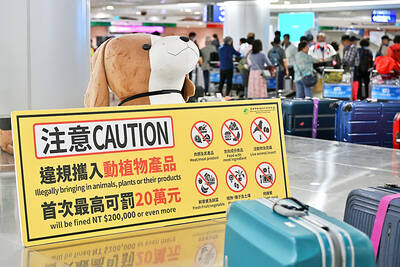Goldman Sachs and Morgan Stanley, with three of their rivals vanquished this year, on Tuesday vowed to remain independent as Wall Street faces its biggest shake-out since the Great Depression hit nearly 80 years ago.
The last two major independent investment houses both posted third-quarter profits despite continued chaos in the financial markets. And their top brass rejected suggestions they must find partners to survive the ongoing credit crisis.
Global banks and brokerages have written down more than US$350 billion from wrong-way bets on mortgage investments and other risky securities during the past year. The upheaval in the US financial system has driven Merrill Lynch & Co and Bear Stearns Cos into emergency sales, and Lehman Brothers Holdings Inc into bankruptcy.
Now, more than ever, analysts are questioning if the stand-alone investment banks that have dominated Wall Street for generations are close to extinction. Eroding investor confidence in the financial industry has prompted questions about whether Goldman and Morgan Stanley need to partner with commercial banks, whose deposits are a more stable.
Commercial banks tend to have slower growth but more dependable earnings since a bulk of the business comes from retail operations. Investment bank earnings are more volatile, and rise or fall on businesses like investment banking and trading.
However, both Goldman Sachs and Morgan Stanley are demonstrating that they have the business model needed to take advantage of the market’s dislocation and remain independent.
Goldman Sachs on Tuesday reported its biggest slump since going public in 1999. Still, the larger of the two remaining major US investment banks beat profit expectations despite a 71 percent decline from last year.
Goldman Sachs posted a profit after paying preferred dividends of US$810 million, or US$1.81 per share, compared to US$2.81 billion, or US$6.13 per share, a year earlier. Revenue for the three months ended Aug. 29 skidded 51 percent to US$6.04 billion.
The results beat Wall Street projections for US$1.71 per share, according to analysts polled by Thomson Reuters.
Revenue fell short of the US$6.23 billion expected by analysts.
On a conference call with analysts, Goldman chief financial officer David Viniar was questioned about the investment bank’s viability without doing some kind of deal.
“We cannot stop the rumors and we cannot stop the fear,” Viniar told reporters during a conference call. “Right now, we think our business model works because our business works. Our performance speaks for itself and will continue to speak for itself.”
His counterpart at Morgan Stanley, Colm Kelleher, made similar comments after the investment bank announced quarterly results one day ahead of schedule. Results were initially scheduled for yesterday.
Morgan Stanley reported a profit of US$1.43 billion, or US$1.32 per share, compared with US$1.54 billion, or US$1.44 per share in the year-ago period.
Thomson Reuters said analysts expected earnings of US$0.78 per share.
Revenue rose modestly to US$8.05 billion from US$7.96 billion.

UKRAINE, NVIDIA: The US leader said the subject of Russia’s war had come up ‘very strongly,’ while Jenson Huang was hoping that the conversation was good Chinese President Xi Jinping (習近平) and US President Donald Trump had differing takes following their meeting in Busan, South Korea, yesterday. Xi said that the two sides should complete follow-up work as soon as possible to deliver tangible results that would provide “peace of mind” to China, the US and the rest of the world, while Trump hailed the “great success” of the talks. The two discussed trade, including a deal to reduce tariffs slapped on China for its role in the fentanyl trade, as well as cooperation in ending the war in Ukraine, among other issues, but they did not mention

Japanese Prime Minister Sanae Takaichi yesterday lavished US President Donald Trump with praise and vows of a “golden age” of ties on his visit to Tokyo, before inking a deal with Washington aimed at securing critical minerals. Takaichi — Japan’s first female prime minister — pulled out all the stops for Trump in her opening test on the international stage and even announced that she would nominate him for a Nobel Peace Prize, the White House said. Trump has become increasingly focused on the Nobel since his return to power in January and claims to have ended several conflicts around the world,

REASSURANCE: The US said Taiwan’s interests would not be harmed during the talk and that it remains steadfast in its support for the nation, the foreign minister said US President Donald Trump on Friday said he would bring up Taiwan with Chinese President Xi Jinping (習近平) during a meeting on the sidelines of the APEC Summit in South Korea this week. “I will be talking about Taiwan [with Xi],” Trump told reporters before he departed for his trip to Asia, adding that he had “a lot of respect for Taiwan.” “We have a lot to talk about with President Xi, and he has a lot to talk about with us. I think we’ll have a good meeting,” Trump said. Taiwan has long been a contentious issue between the US and China.

Taiwan’s first African swine fever (ASF) case has been confirmed and would soon be reported to the World Organization for Animal Health (WOAH), Minister of Agriculture Chen Junne-jih (陳駿季) yesterday. The Ministry of Agriculture’s Veterinary Research Institute yesterday completed the analysis of samples collected on Tuesday from dead pigs at a hog farm in Taichung and found they were ASF-positive. Animal and Plant Health Inspection Agency Animal Quarantine Division chief Lin Nien-nung (林念農) said the result would be reported to the WOAH and Taiwan’s major trade partners would also be notified, adding that pork exports would be suspended. As of Friday, all samples